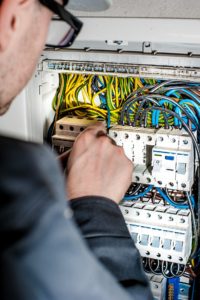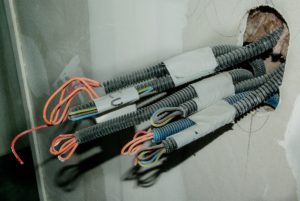Common Electrical Wiring Questions
Whether you are a skilled electrician or an at home do it yourselfer, it is not unusual for you to have some common electrical wiring questions. These may come up in reference to a rewiring job you are doing or you may wonder if wiring is to blame if there are issues with the electrical equipment in your home. Whatever the case may be, here are some common electrical wiring questions and answers.
Common Electrical Wiring Questions:
-
 What do I need to know about appliance wiring?
What do I need to know about appliance wiring?
This is a common electrical wiring question since homeowners often encounter an issue involving appliance wiring. Every appliance has an electrical connection and each specific outlet requires a certain breaker they need to be connected to. Some appliances, such as garbage disposals, need a simple 120 volt circuit breaker or single-pole circuit breaker. Others need a 240V feed that requires a double pole circuit breaker.
-
How do I know if my electrical wiring connection is good or bad?
Some electrical connections are good…others not so much! Product manufacturers might give you a choice of connection points which include switches and outlets. You may be able to ascertain which will be the wisest choice by researching and using common sense.
Whatever you do, beware of loose connections that can cause devices to heat up and result in an electrical fire. Create a safe and secure connection that will last a long time.
-
What do I need to know about electrical service wiring?
When you are doing electrical wiring, it is important to make sure there are proper connections to electrical service components, including electrical meters, electrical panels and subpanels. Know where to place the wires on each before beginning. These devices are key to your electrical system and electricity will not flow properly if connections are poor.
-
What do I need to know about electrical device wiring?
This is a common electrical wiring question as many homeowners may have issues that involve electrical device wiring. Like appliances, devices may need either 120V or 240V outlets. You need to be aware of which outlet your device requires. You should also know the proper way to strip, bend and tighten connections so that they are safe, secure and long lasting.
-
What do I need to know about wiring size and application?
 Before you wire anything, assess if you are using the proper size and type of wire. The color of the wire will be key in determining whether a wire is hot, neutral or ground. The size of the wire will determine how it handles the ampacity that flows through it. Size may also vary depending on what type of wire you are installing. The wire should be of the right size and color as these are essential for a safe installation.
Before you wire anything, assess if you are using the proper size and type of wire. The color of the wire will be key in determining whether a wire is hot, neutral or ground. The size of the wire will determine how it handles the ampacity that flows through it. Size may also vary depending on what type of wire you are installing. The wire should be of the right size and color as these are essential for a safe installation.
Now that you know the answers to these common wiring questions, you may be closer to being able to do wiring in your home. However, finding out specifics about the kind of supplies you need and making sure you are making a secure connection is also essential. Those who are about to perform any electrical wiring task should research carefully to make sure they are installing safe wiring in their home.
